
Topics
In December, Democracy Now! headed to the city of Calais, site of France’s largest refugee camp. Six to seven thousand people are camped out in makeshift tents. Their goal is to reach Britain, and each night members of the camp set out along the highway to the Channel Tunnel, where they attempt to cross into Britain by jumping on top of or inside trucks or lorries. We meet Majd, a 21-year-old Syrian man, one of thousands stranded in the the camp. He describes how a Sudanese man named Joseph was recently killed when he was run over by a car on the highway. While we were there, camp residents protested that the police hadn’t stopped the driver, and held signs reading “We are humans, not dogs” and “What do the survivors of war have to do to live in peace?” This comes as the world faces the greatest exodus of people since World War II. The United Nations has appealed for $20 billion in additional aid money, saying that at present funding levels, the U.N. is “not able to provide even the very minimum in core protection and lifesaving assistance.” U.N. officials cited the wars in Syria, Afghanistan, Iraq, Yemen and South Sudan as one of the major reasons there are nearly 60 million people forcibly displaced worldwide. The largest single displaced community is Syrians, with 4 million refugees forced outside Syria’s borders by the ongoing conflict.
Transcript
AMY GOODMAN: We turn now to two of the biggest stories of 2015: war and Europe’s worst refugee crisis since World War II. More than a million refugees have come to Europe this year—three to four times as many as 2014. Almost 3,700 have died or went missing on their way to Europe. The United Nations has appealed for $20 billion in additional aid, saying, at present funding levels, the U.N. is, quote, “not able to provide even the very minimum in core protection and lifesaving assistance.” U.N. officials cited the wars in Syria, Afghanistan, Iraq, Yemen and South Sudan as one of the major reasons there are nearly 60 million people forcibly displaced worldwide. The largest single displaced community are Syrians, with 4 million refugees forced outside Syria’s borders by the ongoing conflict.
In December, Democracy Now! traveled to the Calais refugee camp, the largest refugee camp in France, about two hours north of Paris. Six to seven thousand people are living there, camped out in makeshift tents. Their goal? To reach Britain. Each night, people set out along the highway to the Channel Tunnel, where they attempt to cross into Britain by jumping on top of or inside trucks or lorries. A few days earlier, before we had arrived, a Sudanese man named Joseph was killed when he was run over by a car on the highway. While we were at the Calais refugee camp, residents were protesting in the freezing cold. They were protesting the police had not stopped the driver who killed Joseph. People held signs, reading, “We are humans, not dogs” and “Do survivors of war not have the right to live in peace?”
AMY GOODMAN: Right next to the refugee camp is this overpass, and we’ve heard that a young Sudanese man was killed, hit by a car, and the car didn’t stop. And the people are angry because the police didn’t arrest the driver. They’re holding up signs in Arabic and English that say, “Our destiny here is unknown,” “Today, Joseph. Tomorrow, who?” “Where is the U.N. in this?” “Europe, do you hear our call from Calais?” “Our destiny here is unknown.”
Can you tell me your name and what you’re doing here?
MAJD: My name is Majd. I’m from Syria. I’m here, like everyone. I’m a refugee, escaped from the war. Yes, from two days ago, it was—there was a refugee on the highway, and some people here on the highway killed him. This is a murder.
AMY GOODMAN: Did they run him over?
MAJD: Yes, they run him over on the highway. Yes. It is not the first time. But it’s the first time he—it’s the first one he is dead, yeah. We have another ones in the hospitals. And there is a lot of violence here. The treatment of the police, the treatment of the truck drivers, it’s not good at all. Yes.
AMY GOODMAN: And so, what does your sign say?
MAJD: Yes, it say, “Today, Joseph. Tomorrow, who?” Maybe me, maybe someone from my country, from my friends, from my family here.
AMY GOODMAN: Where was Joseph from?
MAJD: Joseph is from Sudan.
AMY GOODMAN: And where are you from?
MAJD: Syria.
AMY GOODMAN: And when did you come here?
MAJD: Two months ago.
AMY GOODMAN: And why are you here?
MAJD: I’m here to go to the U.K., yes.
AMY GOODMAN: To?
MAJD: The U.K., United—to the United Kingdom.
AMY GOODMAN: Yes.
MAJD: Yes.
AMY GOODMAN: And where did you live in Syria?
MAJD: In Damascus.
AMY GOODMAN: And why did you leave?
MAJD: I escaped from the war. I don’t want to be—to die. This war is not my war. Yes, everyone is fighting in my country, yes. So, I escaped from the war. I don’t want to be dead for nothing.
AMY GOODMAN: How old are you?
MAJD: Twenty-one.
AMY GOODMAN: Are you a student?
MAJD: No, no. I was working, yes.
AMY GOODMAN: And what was happening in Damascus?
MAJD: In Damascus, now it’s just the Assad regime there. They’re taking all the young people, the young boys, to the war. They must go to the army. Yes, there is no—no one there is civilians, yes.
AMY GOODMAN: And you said everyone is attacking your country. Who?
MAJD: Yes. Who? Everyone. Russia and America and Iran—everyone. Yes.
AMY GOODMAN: And so, what do you want to do?
MAJD: I just want to live in peace and be like any human again. Yes, to have a family, to be safe. Yes, that’s just it.
AMY GOODMAN: Is your family back in Syria?
MAJD: Yes, yes. I have just three—two sisters and one brother, small brother.
AMY GOODMAN: They stayed.
MAJD: Yes, and my father and mother are there.
AMY GOODMAN: And what did your parents think about you leaving?
MAJD: They just want me to be safe, yeah. They sent me out.
AMY GOODMAN: Do you think the Russian, Syrian, French, British bombing of Syria will save it?
MAJD: No, no, no, it’s not a solution. You can’t protect someone by killing someone else. You know? They can’t stop the bombs here when they bomb in Syria. Yes, it’s not a solution.
AMY GOODMAN: What is the solution?
MAJD: The solution is not giving the weapons to everyone. They’re giving the weapons to the Free Army, to the Assad regime, to ISIS. They just give weapons and money, and just they let them fight in my country. Just stop the weapons.
AMY GOODMAN: Now, Britain just voted. The U.K. just voted to bomb Syria, as well. You want to try to get into Britain.
MAJD: Britain or the U.S.A. The governments or the people? Who votes? Who voted? I’m asking. The government, who—I mean, it’s not the people. I will go to the U.K. to live with the civilians. I am not going to their government, yes.
AMY GOODMAN: Majd has just taken us to the house that him and his friends have built out of—you made it out of wood?
MAJD: Wood, yes.
AMY GOODMAN: And plastic?
MAJD: Plastic and some blankets.
AMY GOODMAN: How many of you sleep in here?
MAJD: Three.
AMY GOODMAN: Three of you.
MAJD: Yes, two on the floor and one in the bed, if you can call it a bed.
AMY GOODMAN: And talk about what—when you were in Syria, where you lived with your family, what you did, what your parents do.
MAJD: We have a building, whole building. My family was in the upstairs, and they have a factory. Yes, a paint factory.
AMY GOODMAN: Uh-huh, a paint factory, yes.
MAJD: Paint factory, yes. It was bombed from five years ago. Yeah, I was living a good life—cars and houses and the parties and everything. Yeah, we lost everything right now.
AMY GOODMAN: I’m surprised you can still smile.
MAJD: Yeah, I have to. If I don’t smile, it will be the end of my life.
AMY GOODMAN: I see on your phone you have a picture of your family. Can you show me?
MAJD: Yes, this is my family, my small brother and my father and my sister—daughter—I don’t know how to call it.
AMY GOODMAN: How many months or years do people stay here?
MAJD: Most of them about—there is no specific time or something. Some people, one week; some people, one year. Yeah.
AMY GOODMAN: And is it legal? Will the police come and take you out of it, this house or this tent?
MAJD: I told you, there is no specific thing to do with the police. It’s not legal, but they can’t take us out. Yes, it’s complicated. They call it a jungle. Yes, it’s where the animals live. They treat us like animals.
AMY GOODMAN: Does the U.N. know that you’re here, that this refugee camp is here?
MAJD: I think we are invisible to the U.N. here. We didn’t see anyone from them. And we didn’t have any help and anything from them. Yeah, I saw them in Greece and other countries, but here, there is no one. They don’t see us. I don’t know. They don’t care, maybe. Yes.
AMY GOODMAN: We’re just back from Majd’s tent, where he lives with two other men. And we’re now on the street of, well, makeshift restaurants. There’s a barbershop. This is the Kabul Café. And right here, as we’re going in, is a map of the whole camp. Let’s go inside.
We’ve come to the back of the Kabul Café—it’s very warm here in this back room—to speak with the owner. Can you tell us your name?
SIKANDAR: Yeah. My name is Sikandar.
AMY GOODMAN: And can you talk to us about when you got to this camp?
SIKANDAR: Yeah. It’s about more than six months.
AMY GOODMAN: And where did you come from?
SIKANDAR: I’m from Afghanistan.
AMY GOODMAN: Where in Afghanistan?
SIKANDAR: Nuristan, but I grew up in Kabul. Yeah.
AMY GOODMAN: And why did you leave Afghanistan?
SIKANDAR: Because of war. Because of Americans’ politics. Because of the England politics. Because they come to my country, use the bombs, the weapons. In my country, we don’t have any weapons. So these weapons is using in Afghanistan, if the terrorists using, if the Americans using, if anyone using, just use it in my country. So, there is war in my country, and I am here.
AMY GOODMAN: We just saw a protest about a death of a young man named Joseph, a Sudanese man who was killed on the highway, on the overpass above. Do you know about that?
SIKANDAR: Yeah, I know. Yeah.
AMY GOODMAN: What happened?
SIKANDAR: It’s happened every day. It’s not just this one time, you know? It’s happened every day, every week. And one month before—in one month, nine people died here in Calais.
AMY GOODMAN: Why are you willing to risk all of this?
SIKANDAR: Because if the people like me, they have problems in their countries, like me. If I have a problem in my country, I have to go forward, you know? I don’t have to go back. If I go back, I’m—100 percent, I die. But for this, I can risk. I say, OK, maybe 50 percent, I go. So some people—I think people are thinking like this: If I go back, I will die, and I have a very bad life. It’s better to try, 50 percent—maybe I will go there and I will arrive there, and I will have a normal life.
AMY GOODMAN: President Obama said the war is ending in Afghanistan. Do you see it ending?
SIKANDAR: Until Americans in Afghanistan, it will be not ending. Never.
AMY GOODMAN: The map of this camp, it’s like a map of the world, or a part of the world.
SIKANDAR: Yeah.
AMY GOODMAN: It’s a map of where refugees are from. Most of these countries have been bombed by the United States.
SIKANDAR: I really didn’t think about it. The map of The Jungle is looking like the map of the world.
AMY GOODMAN: Syria, Afghanistan, Iraq, Sudan.
SIKANDAR: Yeah, yeah. Yeah, yeah, yeah. It’s true. I didn’t think about it, but, yeah, it’s true.
AMY GOODMAN: We’re walking through the refugee camp, just outside of Calais. As we walk, some people just pass us, some people stop and look. And occasionally people stop to talk. But we’ve been warned over and over that people don’t want their faces shown. They’re afraid. They’re afraid of being targeted here, and they’re afraid their families will be targeted at home. It’s very cold and overcast. It’s just rained, so it’s very muddy. And it looks like it’s going to be raining again.
Do you want to say your name?
SIDIQ HUSAIN KHIL: My name is Sidiq Husain Khil, and I am from Afghanistan.
AMY GOODMAN: When did you come here?
SIDIQ HUSAIN KHIL: I am here since four-and-a-half months.
AMY GOODMAN: And why did you come here?
SIDIQ HUSAIN KHIL: I want to go to U.K., because in Afghanistan, you better know, the situation are very bad. And America comes there. They want to finish al-Qaeda and terrorism, but they are unsuccessful in that. Instead of that, to finish the terrorism, they increased the war in Afghanistan. And the people are in a very bad situation. It’s all because of America.
AMY GOODMAN: Where do you come from in Afghanistan?
SIDIQ HUSAIN KHIL: I come from Kunar.
AMY GOODMAN: What is it like? Was it destroyed? Was it bombed?
SIDIQ HUSAIN KHIL: Yeah, Kunar was totally destroyed. And a big group of Americans were there. There was a big base. And still, Kunar is under bombing, from—even from Pakistani side. All areas of Kunar is. Each day and every day, the Pakistan is bombing on Kunar. And at that time, was also American were bombing there, because from the past the people of Kunar are all like—you know, they are religious people, all of them, like that are the—this is the main center of Taliban.
AMY GOODMAN: Why do you think they’re bombing?
SIDIQ HUSAIN KHIL: Because they say these people are Taliban, they are terrorists, Americans are bombing there. And Pakistan is also bombing there. Pakistan think that the Taliban are hiding here. And they were thinking that Osama is also there and the Hezb-e Islami leader, Gulbuddin Hekmatyar, is also there. That’s why Kunar is mostly under attack.
AMY GOODMAN: Were there drone strikes in Kunar?
SIDIQ HUSAIN KHIL: Yes, there were drone attacks.
AMY GOODMAN: And what effect do they have? Did you know people killed?
SIDIQ HUSAIN KHIL: They’re always killing innocent people. They’re bombing on the civilians, on the villages. In fact, they were not Taliban. Many times they kill civilians there.
AMY GOODMAN: And how does that make people feel?
SIDIQ HUSAIN KHIL: They make people unhappy, disappointed, from both sides—from government and from the—from the whole world, from America, from all the people.
AMY GOODMAN: Al-Qaeda, Daesh, do you think it increased since 2001?
SIDIQ HUSAIN KHIL: Since 2001, yeah, because, you know, if they are bombing on civilians—America or the NATO or all these groups—if they are bombing on civilians, civilians become very angry, and they join the group of Taliban. That’s why if they are killing one person or 10 person, 100 of them are joining the group of Taliban. They don’t support the government, because government cannot help them.
AMY GOODMAN: So are you saying the bombing increased terrorism?
SIDIQ HUSAIN KHIL: Yes. The war is not the solution for finishing terrorism. They have to talk face by face. What is their demand, you know? Look to the Syria. The whole world is bombing Daesh, but they are increasing. They can’t do anything.
AMY GOODMAN: When did you actually leave Afghanistan?
SIDIQ HUSAIN KHIL: I left Afghanistan in—I think in August. I don’t know. Five, six months ago.
AMY GOODMAN: And how did you make your way out?
SIDIQ HUSAIN KHIL: It’s a big story. It’s very difficult. You know, everyone knows. I come to Iran. Then, after that, I come to Turkey. After that, I come to Bulgaria.
AMY GOODMAN: Do you drive? Do you walk? Do you—
SIDIQ HUSAIN KHIL: We—sometimes we were in buses, sometimes we were walking, in the mountains when we were crossing the borders.
AMY GOODMAN: So, from Bulgaria to where?
SIDIQ HUSAIN KHIL: From Bulgaria to Serbistan.
AMY GOODMAN: To?
SIDIQ HUSAIN KHIL: To Serbia.
AMY GOODMAN: And then?
SIDIQ HUSAIN KHIL: Then to Hungary.
AMY GOODMAN: And then?
SIDIQ HUSAIN KHIL: Then to Austria.
AMY GOODMAN: And then?
SIDIQ HUSAIN KHIL: And then, you know, to Italia, France. And now I’m here.
AMY GOODMAN: It’s a very, very long trip.
SIDIQ HUSAIN KHIL: It’s a—yeah, of course, it’s a very long trip. It’s not that easy just to buy the ticket of airplane and go to the airport, sit in the plane and come directly here. We were just illegally crossing the borders, and that is very difficult, a very difficult task. We lost many of our friends. They lost their—they passed away, they lost their lives. And some of the people, they’re not with us now.
NERMEEN SHAIKH: And your family? Is your family with you here?
SIDIQ HUSAIN KHIL: No, my family is not here.
AMY GOODMAN: Where is your family?
SIDIQ HUSAIN KHIL: They’re in Afghanistan. Yes.
NERMEEN SHAIKH: So, what do you think the U.S. should be doing now?
SIDIQ HUSAIN KHIL: I told you, you know, U.S. is just increasing the war. Actually, U.S. don’t want to finish the war. It’s their game. It’s the game of George W. Bush, Obama and all the European Union. They don’t want to finish that.
AMY GOODMAN: Why?
SIDIQ HUSAIN KHIL: Because it’s on the—behind, there are their profits, their benefits. They are selling their weapons and using in the Islamic countries. This is the big point. How much they spend there? If they spend $100, they’re getting from there $1,000. They don’t care about the people who are dying there.
AMY GOODMAN: President Obama said they’re wrapping up the war in Afghanistan. Do you feel like the U.S. is ending the war in Afghanistan?
SIDIQ HUSAIN KHIL: What do you mean, sorry, by “wrapping”?
AMY GOODMAN: Ending the war.
SIDIQ HUSAIN KHIL: Ending. No, never he will end the war. Never he will end the war.
AMY GOODMAN: Can you be safe in Afghanistan?
SIDIQ HUSAIN KHIL: I don’t think so. If I was safe there, I don’t like to live here in these tents. And I don’t like these, the high buildings, the beautiful countries. My country is my country. But, you know, I was not safe there.
AMY GOODMAN: Did things change here after the November 13th attacks in Paris?
SIDIQ HUSAIN KHIL: Yes. But, you know, it’s—everywhere, the police are checking. The security is very strong. And, yes, it’s totally changed nowadays. Before, it was good. The border was also good. Nowadays, it’s very strong security.
AMY GOODMAN: Did they come here after the attacks?
SIDIQ HUSAIN KHIL: Yes. Each night, they are coming here.
AMY GOODMAN: So even though the U.K. and the United States bombed your country, you would like to go live there?
SIDIQ HUSAIN KHIL: Yes, both are the same for us. America, U.K., France—all the European countries are the same for us, because they are bombing our countries and they destroyed our countries. But their countries are OK and good.
AMY GOODMAN: We then went to another area, where there were, well, sort of small campers that people had donated for families. We met a woman who had been a teacher in Kabul, Afghanistan, before she fled with her four children. She and her 12-year-old daughter described their journey.
DUR: We had to travel by bus, by car, by horse, by train, until here, by boat, all.
AMY GOODMAN: Can you tell me how you got from Afghanistan to France?
DUR: From—I will let my daughter tell you.
AMY GOODMAN: So, how did you get from Afghanistan here to Calais?
DUR’S DAUGHTER: At first we go to Nimruz province of Afghanistan. Then we go—we went to Pakistan. Then we walked to Saravan, Balochistan. Then Iranshahr, Kerman, Shiraz, Tehran, Tehran, Kurdistan, and [inaudible], Turkey and Iran. Then we start walking in mountains. Then we went to Turkish—Türkiye, then [inaudible], then Istanbul, Izmir. Then we arrived to sea. And then—
AMY GOODMAN: You took a boat?
DUR’S DAUGHTER: Yeah, we took a boat. Then—
AMY GOODMAN: Was that scary?
DUR’S DAUGHTER: Yeah.
DUR: Yeah, all of us scared from the boat. At first, when I saw that boat, I don’t know about this boat. When I saw that they—after that, they said, “You come.” I called all my children and told my [inaudible], and I start to cry. Oh, I bought death by money. I spent all my money to buy them death, for all of you. Yeah.
AMY GOODMAN: To buy?
DUR: To buy the death.
AMY GOODMAN: To buy death for all of you.
DUR: For all of you. And I start crying.
AMY GOODMAN: And you made it. And then where did you land?
DUR’S DAUGHTER: In Greece.
AMY GOODMAN: In Greece.
DUR’S DAUGHTER: Yeah.
AMY GOODMAN: In Greece. And then, where did you go from Greece?
DUR’S DAUGHTER: Then we went to Macedonia, Serbia.
AMY GOODMAN: Macedonia.
DUR’S DAUGHTER: Yeah.
AMY GOODMAN: Serbia.
DUR’S DAUGHTER: Croatia. And—
AMY GOODMAN: Croatia.
DUR’S DAUGHTER: Croatia. Autriche.
AMY GOODMAN: Oh, Austria.
DUR: Hungary.
DUR’S DAUGHTER: Ah, Hungary, then Autriche.
AMY GOODMAN: Oh, Hungary, then Austria.
DUR’S DAUGHTER: Yeah.
AMY GOODMAN: This is quite a geography lesson that you lived.
That was Dur and her 12-year-old daughter. After we left their camper, just as we were heading out of the camp, a young man ran after us. He said he wanted to tell us his story.
NAJIBULLAH: My name is Najibullah. I am from Afghanistan, Kabul. And I was working with the U.S. Marines back in Helmand province, Musaqara. And—
AMY GOODMAN: When?
NAJIBULLAH: It was 2011, yeah.
AMY GOODMAN: What were you doing?
NAJIBULLAH: I was interpreter with the U.S. Marines, yeah. And we were in a FOP, forward operation base. And then, yeah.
AMY GOODMAN: And how long did you work?
NAJIBULLAH: I was working with them seven years—seven months, yeah.
AMY GOODMAN: And then, also for a U.S. contractor?
NAJIBULLAH: And before that, yeah, I was also working in a construction company, in Creative International company. They were running a project by the name of Crowded House. That project was from the DOD side for—they were creating culverts, bridges and retaining walls for the people of Daykundi province, yeah.
AMY GOODMAN: And so, did you apply for immigration to the United States?
NAJIBULLAH: Yeah, I applied for a special immigration visa, but they—because I was working just for seven months, the U.S. government refused to give me visa because they said, “You just worked for seven months, not one year.” And I sent a letter from the Creative International company that I—as evidence that I worked with them also. So, if we put all together, it becomes more than one year. But still they said, “That’s not a kind of evidence. You should send us a HR letter from the international company.”
AMY GOODMAN: Sort of on letterhead from Creative International.
NAJIBULLAH: Yeah. So they said—but that letter which I had, that was from the—from those people who was working with us from the DOD side. And those numbers and emails were just, you know, local from Afghanistan. And by the—from the day they left Afghanistan, those numbers—emails doesn’t work. And what I am trying to say, that working with the U.S. government, it doesn’t matter; you work just one day or a year or two years or for four years, it doesn’t matter to the Taliban. As long as you work with them just one hour, you’re condemned to death. So, that’s what happened to me. I was condemned to death. And I am asking the U.S. government why they refuse me to give me a visa. And that’s why I’m here. That’s why I am here, I’m facing this difficulty.
AMY GOODMAN: Just a few of the thousands of Afghans now stranded in the Calais refugee camp, among six to seven thousand others, about two hours north of Paris by train, as they risk their lives to reach Britain. Double and, in some places, triple rows of barbed wire fences were built recently, securing both the entrance to the Chunnel—that’s the Channel Tunnel—and the tractor-trailer staging area for trucks bound for the U.K. All trucks entering the tunnel are also subjected to infrared scanning, looking for body heat, for stowaways. Just months ago, it was common for scores of people to transit the tunnel nightly, hidden in trucks or on the high-speed train. Now it’s almost impossible.
It’s 14 years into the U.S. war in Afghanistan. President Obama had pledged to withdraw the majority of the thousands of U.S. troops deployed to Afghanistan by the end of 2015. But in October, he reversed course and, instead, indefinitely extended the longest war in U.S. history. There are now nearly 60 million people forcibly displaced worldwide, the largest number since World War II.
Special thanks to Democracy Now!’s Laura Gottesdiener, Nermeen Shaikh, Hany Massoud and Denis Moynihan. When we come back from break, we speak with a French journalist who was held hostage by ISIL for more than 10 months. Stay with us.

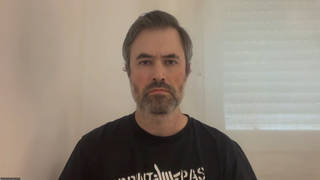
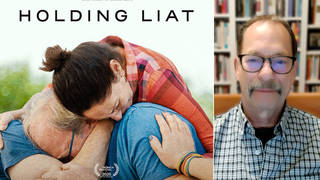
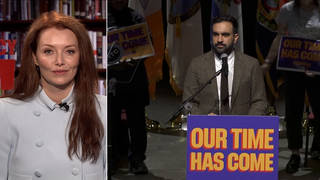
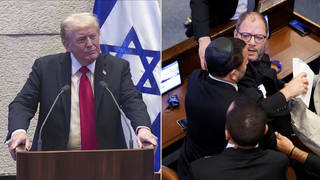





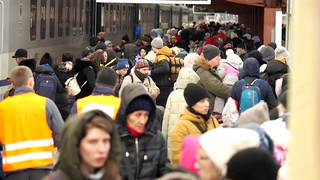
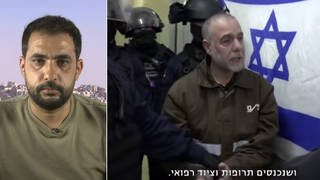
Media Options